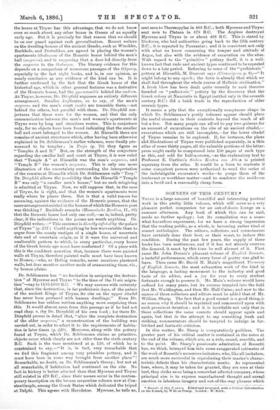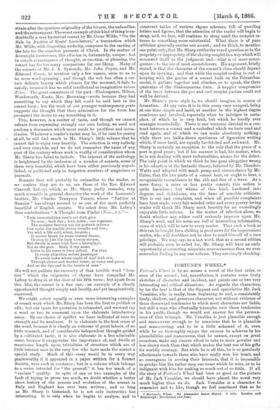SONNETS OF THIS CENTURY.*
THERE is a large amount of beautiful and interesting poetical work in this pretty little volume, which will serve as a very pleasant pocket companion for an out-of-doors lounge on a summer afternoon. Any book of which this can be said, needs no further apology ; but its compilation was a some- what hazardous experiment, for we have a strong impression that the reading public, as a whole, is becoming rather tired of sonnet anthologies. The editors, collectors, and connoisseurs have certainly done their best, or their worst, to induce this condition. During the past few years, the supply of these books has been continuous, and if it has not already overrun the demand, it must by this time be well abreast of it. First came Mr. John Dennis's pleasant volume of English Sonnets, a tasteful performance, which every lover of poetry was glad to have. Then came Mr. David M. Main's magnificent Treasury of English Sonnets, the most exhaustive work of the kind in the language, a lasting monument to the industry and good taste of its editor, and a joy for ever to every student fortunate enough to possess it. Mr. Main's volume would have sufficed for many years, but its success tempted into the field first Mr. Waddington, and then Mr. Hall Caine; and now to the names of these collectors and editors must be added that of Mr. William Sharp. The fact that a good sonnet is a good thing, is no reason why it should be reprinted and commented upon with such persistent iteration ; and it is inevitable not only that in these collections the same sonnets should appear again and again, but that in the attempt to say something fresh and striking, commentators should be templed to indulge in far- fetched and fantastic criticism.
In this matter, Mr. Sharp is comparatively guiltless. The greater part of his critical matter is contained in the notes at the end of the volume, which are, as a rule, sound, sensible, and to the point. Mr. Sharp's passionate admiration of Rossetti has, we think, betrayed him into some exaggerated estimates of the work of Rossetti's numerous imitators, who, like all imitators, are much more successful in reproducing their master's charac- teristic defects than his characteristic merits. As represented here, where, it may be taken for granted, they are seen at their best, they strike us as being a somewhat affected company, whose principal aim is to express manufactured thought and unreal emotion in laborious imagery and out-of-the-way phrases which
• &motets of this C Mary ltditwd and Arranged, with a Critical Introduction on the Sonnet, by Wili.m Sharp. London: IV. Scott.
strain after the spurious originality of the bizarre, the unfamiliar, and the extravagant. The worst example of this kind of thing is un- doubtedly a very hysterical sonnet by Mr. Oscar Wilde, " On the
Sale by Auction of Keats' Love-letters," a transaction which Mr. Wilde, with disgusting audacity, compares to the casting of the lots for the seamless garment of Christ. In the matter of downright irreverence, this effusion is, fortunately, unique; but in simple extravagance of thought, or emotion, or phrasing, the sonnet has far too many companions for our liking. Many of the sonnets of Mr. J. A. Symonds, Mr. John Payne, and Mr. Edmund Gosse, to mention only a few names, seem to us to be mere word-spinning ; and though the web has often a cer- tain delicate beauty which pleases for the moment, it fails to satisfy, because it has no solid intellectual or imaginative raison .d'être. The great sonneteers of the past--Shakespeare, Milton, Wordsworth, Keats, Mrs. Browning—wrote because they had
something to say which they felt could be said best in the sonnet form ; but the work of our younger contemporary poets suggests the thought that their admiration for the form has prompted the desire to say something in it.
This, however, is a matter of taste, and though we cannot refrain from expressing strongly our own feeling, we need not prolong a discussion which must needs be profitless and incon- clusive. Whatever a reader's tastes may be, if he care for poetry at all, he will find much in Mr. Sharp's little volume that he cannot fail to enjoy very heartily. The selection is very catholic and very complete, and we do not remember the name of any poet of the century whose work is worthy of consideration whom Mr. Sharp has failed to include. The interest of the anthology is heightened by the inclusion of a number of sonnets, some of them very beautiful, which have been either previously unpub- 4ished, or published only in forgotten numbers of magazines or journals.
Sonnets that will probably be unfamiliar to the reader, as we confess they are to us, are those of the Rev. Edward Cracroft Leffoy, which, as Mr. Sharp justly remarks, very much resemble in general character the work of the Laureate's
brother, Mr. Charles Tennyson Turner, whose "Lattice at Sunrise" has always seemed to us one of the most perfectly beautiful of English sonnets. We select from Mr. Lefroy's four contributions "A Thought from Pinder (Nem., v.) :"— " Twin immortalities man's art doth give
To man : both fair ; both noble; one supreme.
The sculptor beating out his portrait scheme Can make the marble statue breathe and live; Yet with a life cold, silent, locative ; It cannot break its stone eternal dream, Or stop to join the busy human stream, But dwells in some high fane a hieroglyph.
Not so the poet. Hero, if thy name Lives in his verse it lives indeed. For then In every ship thou sailest passenger To every town where aught of soul doth stir, Through street and market borne, at camp and game,
And on the lip and in the hearts of men."
We will not palliate the enormity of that terrible word " loca- tive " which the exigencies of rhyme have compelled Mr. Lefroy to drag in at the close of his fifth verse; but apart from this blot, the sonnet is a fine one,—an example of a clearly apprehended thought simply and lucidly, and yet imaginatively, expressed.
We might select equally or even more interesting examples
a sonnet work which Mr. Sharp has been the first to publish or edit; but our space for quotation is exhausted, and we must say
a word or two in comment upon the elaborate introductory essay. By our choice of epithet we have indicated at once its strength and its weakness. It is elaborate in the best sense of the word, because it is clearly an outcome of great labour, of no little research, and of considerable independent thought guided by a cultivated taste; it is also elaborate in a less admirable sense, because it exaggerates the importance of, and dwells at wearisome length upon, trivialities of structure which are of little interest save to the very few who have made the sonnet a special study. Much of this essay would be in every way praiseworthy if it appeared in a paper written for a Sonnet Society, were such in existence ; but in a volume which belongs to a series intended for "the general," it has too much of a "caviare" quality. In spite of one or two examples of the fault of trying to prove too much, we doubt whether a better short history of the genesis and evolution of the sonnet in Italy and England has ever been written ; and so long
as Mr. Sharp is historical, he is not only instructive but interesting. It is only when he begins to analyse, and to construct tables of various rhyme schemes, full of puzzling letters and figures, that the attention of the reader will begin to stray, and, we fear, will continue to stray until the essayist re- turns to something more substantial. What there is of pare criticism generally carries our assent ; and we think, to mention one point only, that Mr. Sharp settles the vexed question as to the propriety or impropriety of the closing couplet in a way which will commend itself to the judgment and—what is of more conse- quence—to the ear of most sonnet-lovers. His argument, briefly stated, is that the character of the sonnet's close should depend upon its opening ; and that while the couplet ending is out of keeping with the genius of a sonnet built on the Petrarchan model, it gathers together and clinches, so to speak, the three quatrains of the Shakespearian form. A happier compromise of the issue between the pro and anti couplet parties could not well be devised.
Mr. Sharp's prose style is, we should imagine, in course of formation. At any rate, it is in this essay very unequal, being at one time simple and lucid, at another in the highest degree cumbrous and involved, especially when be indulges in meta- phor, of which he is very fond, but which he hardly ever manages successfully. There is one sentence devoted to a con- trast between a sonnet and a cathedral which we have read and read again, and of which we can make absolutely nothing ; while there are half-a-dozen specimens of figurative writing which, if more lucid, are equally far-fetched and awkward. Mr. Sharp is certainly an exception to the rule that the prose of a poet is good prose; but if his manner is bad, his matter, when he is not dealing with mere technicalities, atones for the defect. The only point in which we think he has gone altogether wrong is his adoption of the fantastic theory, fathered by Mr. Theodore Watts and adopted with much pomp and circumstance by Mr. Caine, that the two parts of a sonnet bear, or ought to bear, a recognisable resemblance to the ebb and flow of a wave. As a mere fancy, a more or less pretty conceit, this notion is quite harmless ; but whims of this kind, hardened into dogmas and definitions, are the bane of sensible criticism. This is our last complaint, and when all possible complaints have been made, every fair-minded critic and every poetry-loving reader will thank Mr. Sharp most heartily for an exceedingly enjoyable little volume. In the matter of selection alone, we doubt whether any editor could seriously improve upon Mr. Sharp's work, and his notes are fell of interesting information, some of which will be new to every reader. That such a book as this can be bought for a shilling is good news for the impecunious reader, who will doubtless not be slow to avail himself of a rare privilege. We may say, as a last word, that as a second edition will probably soon be called for, Mr. Sharp will have an early opportunity of correcting misprints more numerous than we ever remember finding in any one volume. They are simply shocking.



































 Previous page
Previous page